Ted Cruz adds billionaire backer to presidential campaign
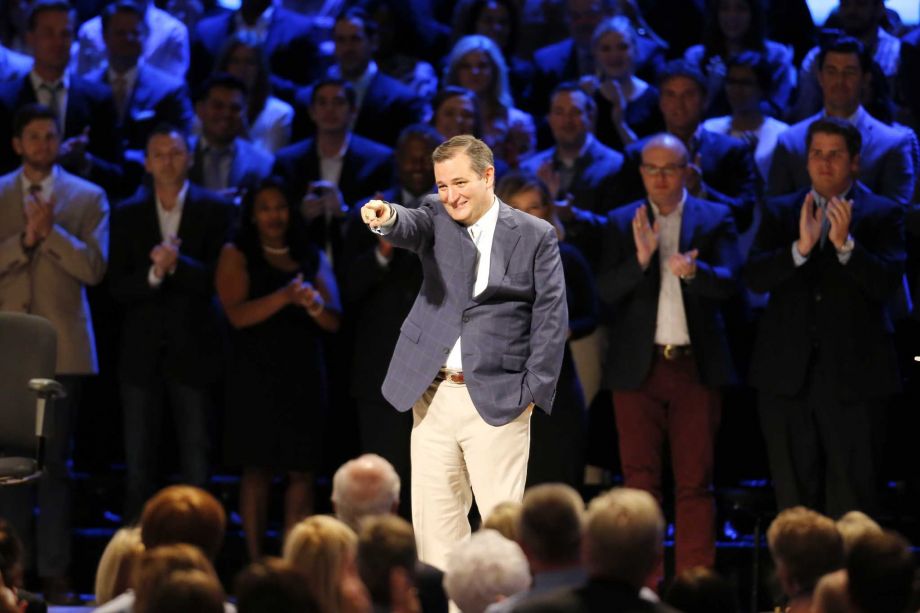
Republican presidential candidate Ted Cruz has picked up the backing of a Texas billionaire and the state’s lieutenant governor, his campaign said Monday. Darwin Deason, a technology entrepreneur, and his son, Doug, had given millions of dollars to the 2016 efforts of former Texas Gov. Rick Perry, who ended his bid for the White House last month. Lt. Gov. Dan Patrick — a one-time foe of the Texas senator — also will now be the Texas chairman of Cruz’s presidential campaign. Cruz is one of several Republican presidential candidates with Texas ties, but he has dominated the state’s generous donor class. In the first nine months of the year, Cruz raised more than three times as much in the state as did Jeb Bush, according to an Associated Press analysis of donations. Bush, a former Florida governor, spent much of his youth in Texas, and his father and brother, both former presidents, still call the state home. The Bush family is rallying around Jeb Bush on Monday at a donor event that’s taking place less than six miles from where Cruz is announcing his team’s additions. Patrick’s backing of Cruz gives him a powerful surrogate in a delegate-rich state where Republican primary voters go to the polls on March 1. And adding the Deasons to his financial team could significantly boost Cruz’s presidential campaign accounts. Darwin Deason poured $5 million into pro-Perry super PACs this year— making him one of the biggest contributors in presidential politics. After Perry’s withdrawal from the race, the super PACs returned much of that money. Cruz also has super PACs working on his behalf. Those groups can take unlimited amounts of money from donors, while the campaigns themselves cannot accept contribution checks from each donor of more than $2,700 per election. When super PACs are factored into the mix, Cruz’s fundraising is second only to Bush’s in the GOP field. Together, the pro-Cruz groups had raised at least $64 million by the end of September, fundraising documents show. Bush and Cruz have both shown they can land big contribution checks. But Cruz holds a sharp fundraising advantage over Bush when it comes to small donors. While only about 4 percent of Bush’s campaign haul has come from contributors giving $200 or less, 41 percent of Cruz’s campaign money is coming from such small donors, fundraising records show. Those kinds of givers are especially valuable because they can provide a constant stream of cash without taking up the candidate’s time attending traditional fundraising events. The Deasons are marquee names for Cruz, but he has quietly consolidated the support of many former donors to Perry and another 2016 dropout, Wisconsin Gov. Scott Walker. The Cruz campaign added five other former Perry backers to its finance team, officials said on Monday. Cruz gained a larger share of those candidates’ donors than anyone else in the race, according to an analysis by crowdpac.com, a nonpartisan political analytics company. Republished with permission of The Associated Press.
Jeb Bush, Ben Carson lead GOP presidential fundraising

Jeb Bush raised $13.4 million this past summer for his Republican presidential bid — more than almost any other primary competitor, but far less than political newcomer Ben Carson, a retired neurosurgeon who collected about $20 million during the same period. Meanwhile, Hillary Rodham Clinton and Bernie Sanders, the two leading Democrats in the 2016 race, each raised more than any of the Republicans who have said what donors gave them between July 1 and Sept. 30. Among those who have yet to share their fundraising information is GOP front-runner Donald Trump, the rich real-estate dealmaker whose mild forays into fundraising include selling his trademark “Make America Great Again” hats. “I thought I’d have spent about $20, $25 million dollars up until this point. You know what I’ve spent? Like nothing,” Trump said Wednesday, crediting media coverage for negating the need to spend on paid ads. With fundraising reports due to federal regulators by midnight Thursday, here’s a look at what we know so far about the state of presidential campaign finance in the third quarter, and what we expect to learn when the candidates’ official reports are filed with the Federal Election Commission. ___ CLINTON, SANDERS RAISE ABOUT THE SAME AMOUNT — IN DIFFERENT WAYS Clinton’s campaign said it raised $28 million in the three months ending Sept. 30. That’s less than what she raised in the early months of her campaign, but more than any previous non-incumbent Democratic presidential primary contestant in the third quarter of the year before Election Day. Most of the money came in through dozens of traditional fundraising events, where the price of entry was often the legal maximum donation of $2,700. Sanders brought in about $26 million, but did so largely through small contributions collected online. He continues to show off his fundraising prowess, harvesting about $2 million in new contributions in the hours that followed Tuesday night’s Democratic debate. “We are doing it the old-fashioned way: 650,000 individual contributions,” Sanders said in his closing statement of that appearance, adding: “We are averaging 30 bucks apiece. We would appreciate your help.” ___ CARSON THE EARLY LEADER IN GOP CONTEST Lots of Republican voters sent a message this summer in preference polls that they want an outsider as their nominee. That’s reflected in how they’re giving to the candidates, too. Retired neurosurgeon Ben Carson appears likely to post the best haul of the dozen-plus candidates in the GOP field, with about $20 million. But his campaign also spent heavily, burning through $14 million over the same time period. Carson spent most of that money raising money, according to figures the campaign provided to The Associated Press. Still, Carson had about $11 million in available cash as of Sept. 30. One of Carson’s closest fundraising competitors is Texas Sen. Ted Cruz, whose campaign raised $12.2 million in the third quarter and ended the month with $13.5 million in the bank. Although he has been a senator since 2012, he also is running as an outsider, with a focus on the many times he has broken with Senate Republican leadership over issues such as shutting down the government to defund implementation of the Affordable Care Act. Former technology executive Carly Fiorina, who has never held elected office, raised $6.8 million for her campaign — four times as much as she collected at the start of her campaign. Her boost came after strong debate performances that also led to a rise in some national preference polls. ___ LOWER FIGURES FOR OTHERS IN GOP Others in the Republican race found the summer months a tough slog for fundraising. Kentucky Sen. Rand Paul raised $2.5 million and Florida Sen. Marco Rubio about $6 million. Paul recently devoted time to a separate bid to keep his Senate seat, leading some to question if he’s still in the White House race. “I wouldn’t be doing this dumb-ass livestreaming if I weren’t,” Paul said in a recent Internet video. “So, yes, I still am running for president. So get over it.” In a memo to supporters on Thursday, the Paul campaign continued to provide assurance that it is “here to stay.” The candidate raised almost $1 million in the 12 days after the September debate, the memo says. Rubio’s campaign argues that it can make its money go the distance because of its extreme frugality. The campaign told top donors that it began October with $11 million socked away. As evidence of its tight ship, Rubio’s campaign manager Terry Sullivan has said he must personally approve all expenses over $500. But Rubio is also getting a boost from a nonprofit group that doesn’t disclose its donors. While the campaign hasn’t purchased any television commercials, the group Conservative Solutions Project has already spent millions of dollars on ads. Weighing on these lower-raising candidates are the fates of Wisconsin Gov. Scott Walker and former Texas Gov. Rick Perry. Both dropped out of the 2016 Republican nominating contest for lack of funds. Federal reports filed Thursday show Perry raised less than $300,000 between July 1 and Sept. 11, when he ended his campaign. It had about $45,000 left in the bank at the end of last month, FEC documents show. And Walker, despite having raised $7.4 million in the summer months, quickly burned through the money and dropped out 10 days after Perry. He closed September with less than $1 million in available cash — not enough to cover the nearly 100 employees on his payroll. ___ HOTLY ANTICIPATED REPORTS New Jersey Gov. Chris Christie and Ohio Gov. John Kasich both entered the Republican entered the race later than the other candidates, meaning Thursday provides the first look at their fundraising. Ahead of Thursday’s filing, Christie’s spokeswoman said the campaign had raised $4.2 million in recent months and had $1.4 million cash on hand at the end of September. Although the haul puts him in the lower tier of Republican fundraisers, Christie played down the importance of money. “We’re doing fine,” Christie recently said
Jeb Bush taking his “SEC primary” push to Alabama-LSU game on November 7
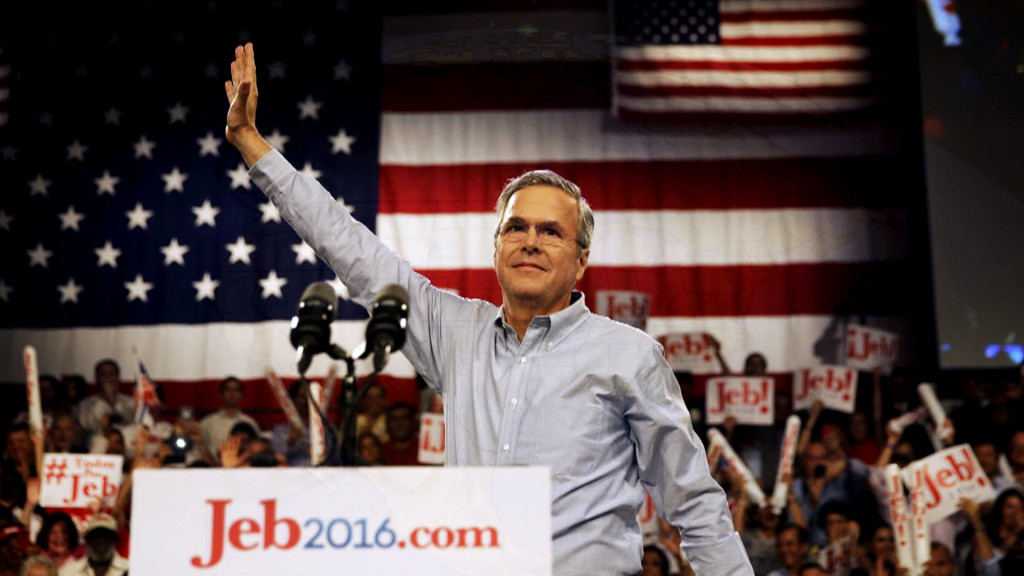
Secretary of State John Merrill on Thursday confirmed in a memo former Florida governor and 2016 GOP presidential candidate Jeb Bush will be on hand November 7th in Tuscaloosa as the Louisiana State University Tigers take on the Crimson Tide of Alabama in a major SEC matchup. “We are excited to have Governor Bush back in our state! Seven of the top ten Republican candidates have made campaign stops in Alabama, which is unprecedented for our state,” said Merrill in a news release. Merrill said the campaign stop is a sign of the effectiveness of Alabama’s recent decision to move up its primary date to join the so-called “SEC primary,” which will see Georgia, Tennessee, Texas, Virginia and possibly North Carolina join Alabama in holding their presidential primary election on March 1. “When this many Presidential candidates are choosing to visit and re-visit Alabama, it is proof the SEC Primary is working,” said Merrill. “The main goal of this effort is to create an environment that forces candidates to appeal to an even larger and more complete constituency than they currently do, and I am proud to see our state receiving the attention it deserves.” Merrill, the state’s chief elections official, disclaimed that the memo was not intended to show preference for Bush – currently running third in Alabama according to recent polling, behind Donald Trump and Ben Carson – but rather to increase awareness of rising political activity throughout the state. Merill also noted in his memo that former U.S. Secretary of State Hillary Clinton will also campaign in Alabama on October 17 at the Alabama Democratic Party‘s semi-annual convention in Birmingham. Notable presidential candidates stopping in the Yellowhammer State along the campaign trail have included Trump, Carson, Sen. Ted Cruz, former Arkansas Gov. Mike Huckabee, Ohio Gov. John Kasich, Sen. Rand Paul, and Wisconsin Gov. Scott Walker on the Republican side, plus Sen. Bernie Sanders on the Democratic ticket.
Marco Rubio to host ‘strategy summit’ with donors in Las Vegas
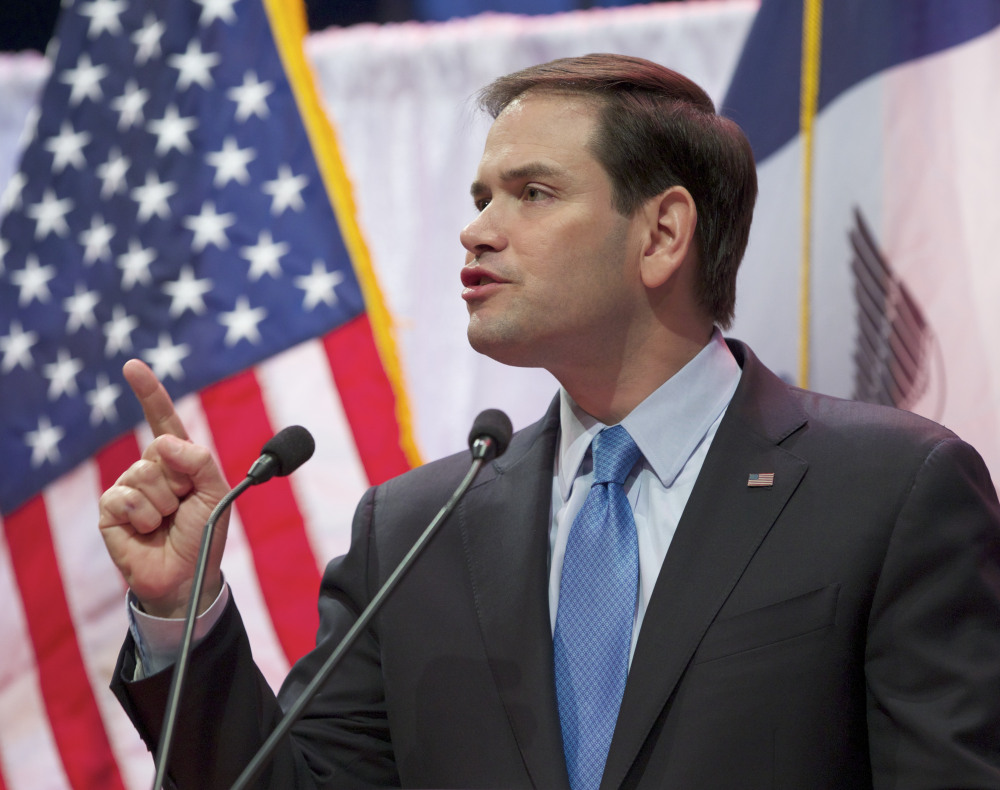
As Marco Rubio enjoys somewhat of a resurgence in national polling, the Republican presidential candidate will host a two-day Las Vegas summit with several top donors next week. The move by the Florida senator is an attempt to woo former backers of Wisconsin Gov. Scott Walker, who dropped out of the race last week after a poor showing at the second televised GOP debate. Rubio’s poll numbers have been on the rise. First reported by Sean Sullivan of the Washington Post, the football-themed “Quarter Four Strategy Summit” will be Oct. 8 and 9 – days after the close of the third quarter fundraising period — at the Bellagio on the Las Vegas Strip. Events include a “breakfast and team talk” and picnic dinner with the senator, according to the event invite. The meeting is to focus on fundraising strategy for the final three months of 2015. While in Nevada, a key early primary state, Rubio expects to hold a series of campaign events. Candidates have until mid-October to report fundraising totals to the Federal Election Commission.
Jeb Bush donors pitch ‘long haul’ after initial ‘shock and awe’
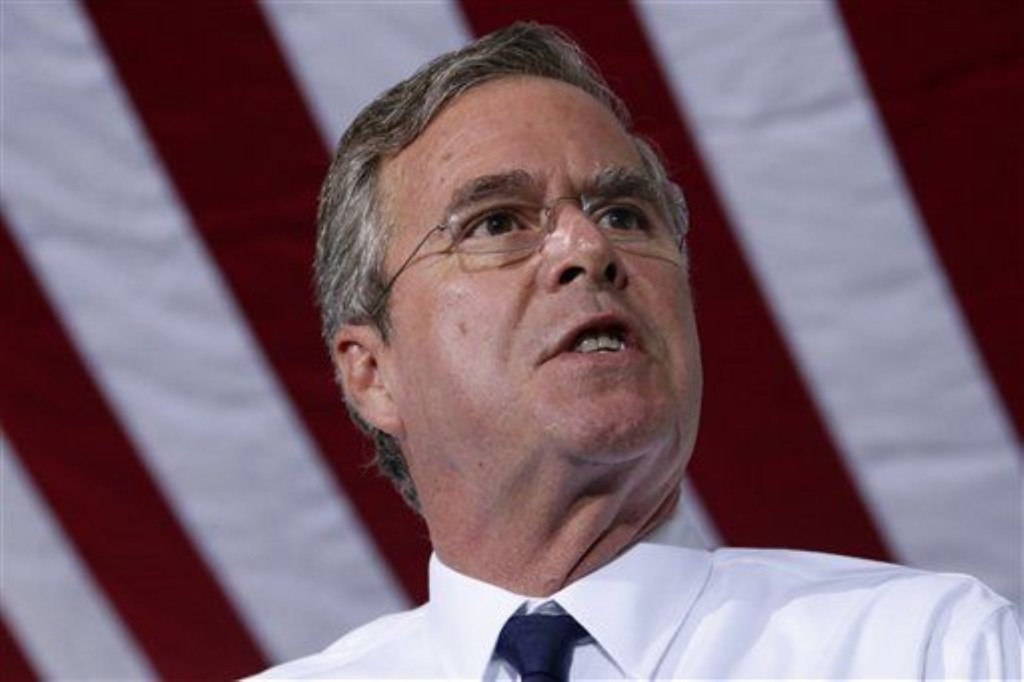
Jeb Bush‘s challenge in the first half of the year was daunting yet simple. To be considered a fundraising success, the Republican presidential candidate had to hit the magic number of $100 million, an ambitious goal set by some in his campaign. And he did. As another fundraising period ends, what now constitutes success for Bush isn’t as clear cut. No longer the front-runner in preference polls, Bush won’t repeat as the champion at raising money in the GOP’s 2016 field, lapped in the past three months by retired surgeon Ben Carson and perhaps by Texas Sen. Ted Cruz, too. “They created such a high bar,” said Spencer Zwick, a top Republican donor who was 2012 GOP presidential nominee Mitt Romney‘s finance chief. “Now anything less than $100 million in a quarter seems small.” But Bush’s financial team and strategists argue that he should now be judged by a different benchmark. Their mantra: He’s built to last. Using phrases like “go the distance,” ”marathon” and “long haul,” they argue that the former Florida governor is uniquely positioned to outlast other candidates, regardless of the fundraising number he posts for the third quarter. “If we were frozen with just the resources we have right now, he could still be in the game right to the very end,” said Kenneth Lipper, a New York financier and top fundraiser for Bush. “Longevity is the right word.” Bush’s finance team describes his fundraising in the past three months as “respectable” and “fine,” while declining to provide the specifics on just how much they raised. That detail will come later this month in a report filed with federal regulators. It’s true that the summer months of the year before the election are typically the bleakest time for candidates to raise money. Romney collected $14.2 million during the same period in 2011, the least of any three-month period between the beginning of his campaign and when he secured the Republican presidential nomination. Yet the summer didn’t slow down Carson, who has never run for office and has raised $20 million since July. Bush aides say they also expect to be topped by Cruz, the Texas senator with unvarnished contempt for his own party’s leadership and an enthusiastic tea party following. Bush has scored harder-to-measure fundraising gains, such as winning the support of Anthony Scaramucci, a national fundraising leader for former candidate Scott Walker. Next week, Bush heads back to Chicago, where he quickly converted former Romney supporters early this year, for a series of fundraisers hosted by wealthy donors who helped get his super PAC soaring. Bush’s fundraising still has a distinctly presidential look, in part because it includes so many who raised money for his father and brother. Bush’s major donors will gather in Houston at the end of the month for a “Jeb celebration” that includes Presidents George H.W. and George W. Bush. “For others, stardom is ephemeral. I’m very happy to see Jeb hold his own,” said Fred Zeidman, a Houston businessman raising money for Bush. “We have the most money and we can outlast. He’s showing the discipline of a long-term candidate.” Unlike Walker, who dropped out of the race because he couldn’t raise enough money to pay for his 100-employee political operation, Bush’s campaign fundraising and campaign scale are in sync, his donors said. That doesn’t mean they are comfortable where they are, or expect to be any time soon, said longtime Bush supporter Al Hoffman, the founder of Florida’s largest real estate development company. “We’re all worried. That’s what we do, we worry all the time,” Hoffman said. “But it’s a healthy sense of anxiety that we can always do more that keeps us going.” Craig Duchossois, a Chicago-area private equity investor and Bush donor, said national polls showing Bush in single digits unnerves some less-seasoned donors. He admits some movement this fall by Bush in early-voting state surveys “certainly would be encouraging.” But he argues that more than anything else, success for Bush at this stage is raising enough money for his actual campaign to stay in the race and take advantage of his super PAC. Helped by two dozen million-dollar checks, it amassed $103 million in donations through the end of June — more than double any other candidate-specific super PAC. “Let me suggest to you that fundraising is not the metric as important for Jeb as it is for everyone else,” said Duchossois, who hosted an event for Bush’s super PAC in February. “Jeb’s goal, and what we consider success, is getting his message across.” Bush, who as a candidate can no longer direct the super PAC, left it in the hands of his top media strategist, Mike Murphy. It has started spending its millions introducing Bush as “a committed conservative” to voters in Iowa, New Hampshire and South Carolina. The tentacles of the official campaign, which also just began advertising, have spread well beyond those early voting states. That’s partly why Austin Barbour said he joined Bush’s campaign after former Texas Gov. Rick Perry, the candidate he’d been helping, dropped out last month. Barbour will help Bush organize a push for wins on March 1, when voters in a dozen states including Texas and Virginia cast their primary ballots. “The campaigns that have the resources to go deep into April,” Barbour said, “those are the ones that are going to survive and thrive. You’ve got to be prepared to go the distance.” Republished with permission of the Associated Press.
Marco Rubio ramping up campaign with more time in early states
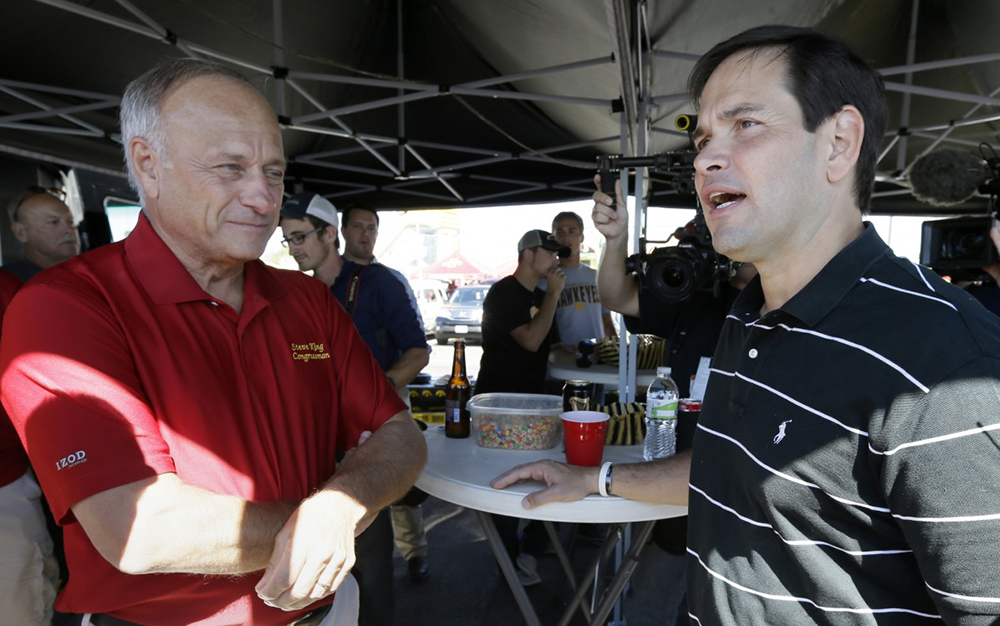
After a summer largely spent raising money for his Republican campaign for president, Marco Rubio says he’s about to start spending a whole lot more time in Iowa and the other early voting states. “There were obviously other things we needed to do,” the Florida senator said this past week in an interview with The Associated Press. “We need the resources to be able to have staff here and be on the air and do the things a campaign requires. But, we were just here a few days ago. We’re going to be back a lot more.” Following a return to Iowa next week he’ll go to the other three states — New Hampshire, Nevada and South Carolina — that are voting in the initial wave of presidential caucuses and primaries, his campaign advisers said. Rubio recently hired a state director in Iowa, a position other campaigns have had in place for months, and has booked millions in television ads that will start airing in November. For Republican activists and party faithful used to fawning attention, it’s about time. Rubio has visited New Hampshire just seven times this year, and five times since he announced his candidacy. By contrast, former Florida Gov. Jeb Bush will make his 14th visit to the state next week, while New Jersey Gov. Chris Christie has been there close to two dozen times. Rubio’s trip this week to Iowa was only his eighth this year, far fewer that many of his competitors — some of whom are staking their bids to win the lead-off caucus state by visiting all of its 99 counties. Former Pennsylvania Sen. Rick Santorum already has. The joke about Rubio is that he is only competing in Ankeny, the Des Moines suburb where his state chairman resides. Iowa Republican strategist Doug Gross, who has not endorsed a candidate, says voters like Rubio but “they haven’t taken him for a test drive.” Since he entered the race in April, Rubio has spent much of his time fundraising. His campaign and outside groups supporting him raised a combined $45 million through the second quarter — considered a good number, but not the biggest in the race. Rubio has posted two well-regarded performances in the first GOP debates and picked up a number of former supporters of Wisconsin Gov. Scott Walker following his abrupt departure last week. “There’s absolutely votes to be had,” said former Iowa Republican Party Chairman Matt Strawn. With Walker out of the race, he said, “the economic conservative establishment lane is less congested.” In New Hampshire, former Sen. Scott Brown, a Massachusetts Republican when he served with Rubio for two years, said he knows many voters who are “very, very interested.” To date, the Republican primary has been dominated by billionaire businessman Donald Trump. Rubio has largely avoided clashes with the outspoken GOP front-runner, but he criticized him Thursday for being “touchy and insecure.” The comments came during a radio interview in Kentucky after Trump had called Rubio a “lightweight.” Rubio said that night that he would seek to remain out of the scrum with Trump as much as possible. “I have no interest in being part of the back-and-forth freak show,” he said. “I’m running for president.” In Iowa on Thursday, Rubio drew an enthusiastic response from the crowd packed into a room at a minor-league baseball stadium. Gary Jones, 60, of Davenport, said he thought Rubio could do well. “His performances in the debates have really helped him,” Jones said. “He doesn’t seem to be sticking a finger in the air and picking up whatever populist wave is blowing.” Republished with permission of the Associated Press.
‘Lean and mean’ campaigns enable GOP candidates to endure
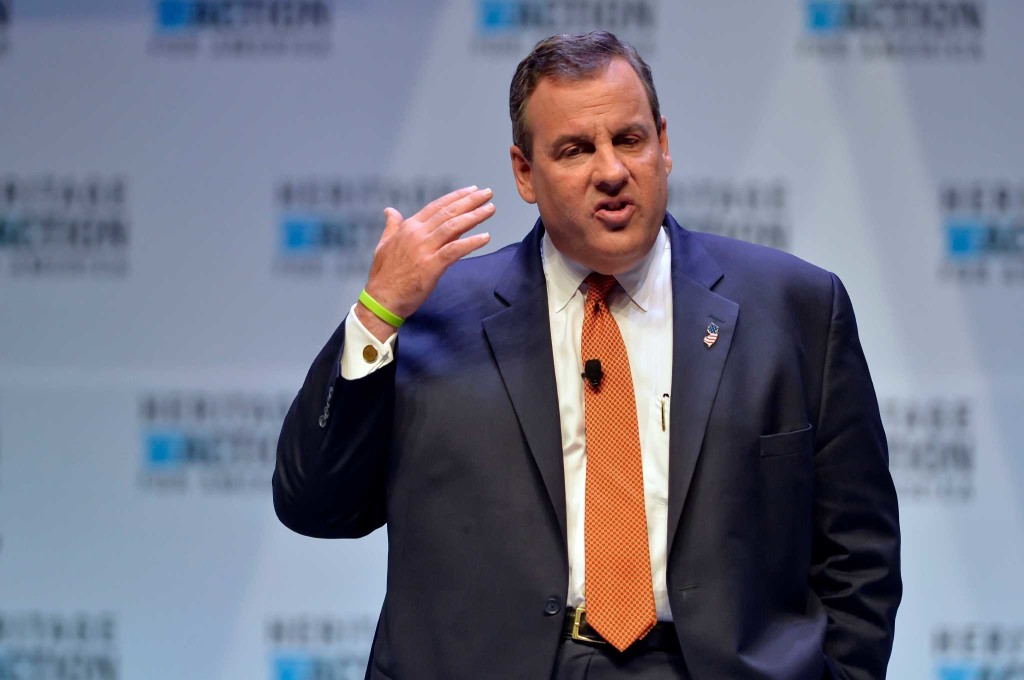
As Scott Walker gave up on his 2016 presidential race this week, he implored other Republicans in the crowded field to follow his lead and drop out – so that one could rise to challenge front-runner Donald Trump. None appears likely to do so anytime soon. Walker stood out in the GOP race with his unsustainable mix of lackluster fundraising and an expensive campaign operation. Few if any of the 15 remaining candidates feel the intense financial pressures that he did, according to a review of fundraising records and interviews with campaign staff. “We certainly don’t have a massive campaign mousetrap that we can’t pay for,” said Curt Anderson, a senior strategist for Louisiana Gov. Bobby Jindal, a presidential hopeful who, as was Walker, is at the bottom of early preference polls. “Maybe other campaigns have gotten a bit out over their skis, but no one quite like he had.” In the 70 days between Walker’s kickoff and his exit from the race, the Wisconsin governor built the kind of campaign operation that more closely resembled that of a party nominee, with nearly 100 employees. Former aides and top donors said Walker’s team crafted a pricey plan to introduce him nationwide, but struggled to raise the millions of dollars needed to pay for the strategy. “People don’t stop running for president because they run out of ideas or they run out of a desire to give speeches,” said Terry Sullivan, Marco Rubio‘s campaign manager, at a panel discussion Monday in Washington. “They stop running because they run out of money.” Walker didn’t even last long enough to file his first formal campaign finance report. The next reports are due in mid-October, and it’s then that Rubio, Jindal and others in the race will have to disclose how their fundraising – and campaign spending – is shaping up. Chris Christie, the governor of New Jersey, was known for expensive tastes while serving as a U.S. attorney and chairman of the Republican Governors Association, preferring chartered planes and luxury hotels for his past politicking. But without an influx of big campaign money and little movement in early polls, his aides say, he’s been thrifty in his three months as a presidential candidate. He generally flies commercial and has traded resorts and high-end meals for Radissons and Mexican food joints. In a fundraising pitch emailed on Wednesday, Matt Mowers, Christie’s New Hampshire director, wrote that $22 lets him invite 50 people to town halls. “Any amount helps,” he wrote. “As we keep this team `lean and mean’ we use this contribution wisely.” While Rubio’s campaign took in about $9.8 million through the end of June, far more than most of the other candidates, his operation is eager to emphasize thriftiness. Sullivan said at a Monday gathering of campaign managers that he personally must approve any expense over $500. He said Rubio almost always flies commercial – even ultra-cheap airlines on occasion. One reason the candidates seem anxious to portray themselves as penny pinchers: Not much money is coming in. The usual summertime fundraising slowdown was exacerbated this year by the dominance of Trump, the billionaire celebrity and real estate mogul who is mostly paying for his own campaign. Many reliable Republican donors are sitting on their wallets until, as Walker advocated, the contest narrows to fewer candidates. And as the departures of Walker and former Texas Gov. Rick Perry show, super PACs and their ability to raise unlimited amounts from wealthy donors can be only so helpful, because those groups are barred from taking directions from the candidate they’re helping. That means super PACs can’t legally pay for the basic expenses of running for president, such as candidate travel and official campaign employees. Most of the underdogs have been eager to portray themselves as scrappy all along. Those who, like Walker, have low-digit support in most recent national surveys have only a handful of employees and are focused on a single state, such as first-to-vote Iowa. That group includes Jindal, South Carolina Sen. Lindsey Graham, former Virginia Gov. Jim Gilmore, former New York Gov. George Pataki and former Pennsylvania Sen. Rick Santorum. “This is the survivor portion of the campaign,” said Matt Beynon, a Santorum spokesman. “You have to build an organization for the resources that you really have, not for the resources you expect or want to have.” Santorum is taking a page from his own playbook. He raised just $920,427 by the time Iowa voters caucused in January 2012. But his strategy of driving himself around in a pickup truck to each of the state’s 99 counties worked: He narrowly won. This time, he raised a little over $650,000 in his first month as a candidate. “Santorum,” Beynon said, “is a master at running underfunded campaigns.” Republished with permission of the Associated Press.
Ranks thinning, traditional GOP candidates try to adapt
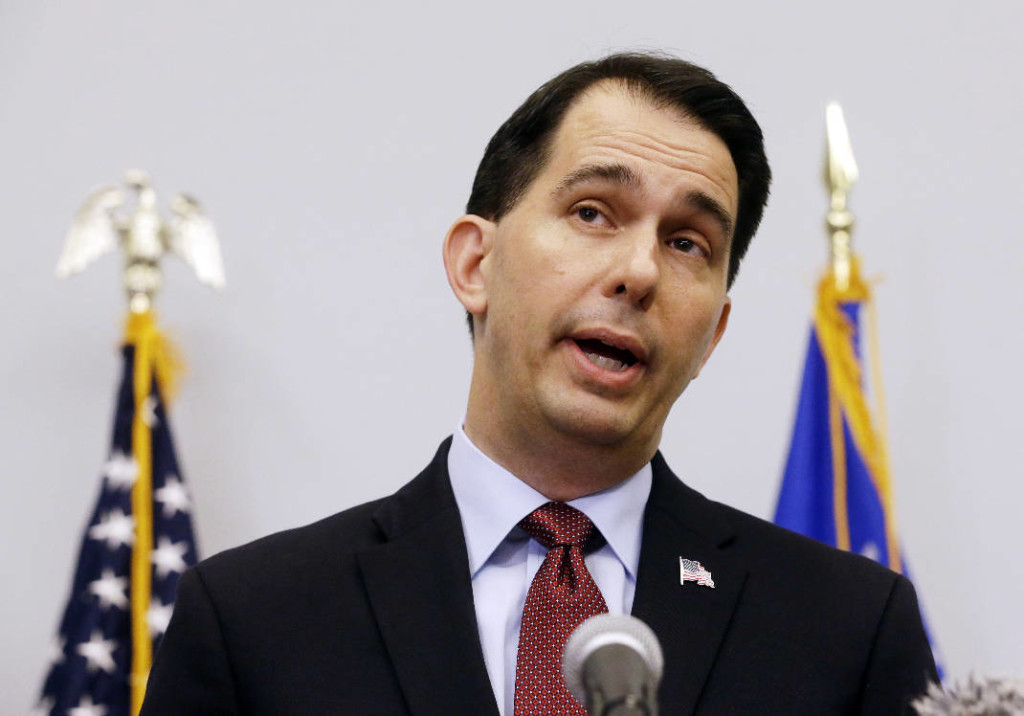
Scott Walker and Rick Perry entered the 2016 presidential race with a combined 18 years of experience as governors. They exited the Republican primary — the first candidates to do so — with negligible support and dwindling bank accounts. While Walker and Perry were both flawed candidates, their swift demise is a warning to others who hope to win the White House on the strength of their political resumes. And it leaves the governors and senators still in the turbulent Republican race scrambling to adapt to a political environment that is rewarding those with the least governing experience. “The country is very unhappy now, and a winning candidate must be viewed as a change agent,” said Scott Reed, a longtime Republican strategist who advises the U.S. Chamber of Commerce. So far, billionaire Donald Trump has been the biggest beneficiary of the public’s demand for an outsider. Retired neurosurgeon Ben Carson and former Hewlett-Packard CEO Carly Fiorina are also attracting voters eager to express their anger with Washington. None of the three has ever won an election. Republicans voters’ apparent desire for a political novice is striking given that conservatives have long attributed some of what they see as President Barack Obama‘s weaknesses to his inexperience when he took office. Obama spent a little less than eight years as an Illinois state senator and ran for president during his first term in the U.S. Senate. As traditional candidates among the current GOP contenders try to break through, they’re employing a two-track strategy: distance themselves from Washington’s political elite while also building a campaign that can outlast voters’ discontent if the anti-establishment mood ultimately fades. In the hours after Walker’s stunning withdrawal Monday, his experienced rivals intensified efforts to pitch themselves as Washington outsiders and political disruptors. “You cannot say that Scott Walker, Rick Perry or myself were insiders in Washington,” said Jeb Bush, the former two-term Florida governor who is also the son and brother of presidents. Advisers for Ohio Gov. John Kasich, a second-term governor and long-serving congressman, touted his efforts to challenge the status quo and even his own party. Kasich has pushed the GOP to do more to address poverty, mental illness and drug addiction, and he created an alternative to party leaders’ spending plans while serving in Congress. “You can either say you’re a change agent and have nothing to show for it but talk, or you can say you’re a change agent and have proof and results that have worked,” Kasich spokesman Scott Milburn said. Kentucky Sen. Rand Paul casts himself as “a new kind of Republican,” one who courts younger voters and minorities. Texas Sen. Ted Cruz has infuriated GOP leaders during his two-and-a-half years in Congress. And Florida Sen. Marco Rubio jumped at the opportunity to distance himself from Congress during last week’s Republican debate. “In my years in the Senate, I’ve figured out very quickly that the political establishment in Washington, D.C., in both political parties is completely out of touch with the lives of our people,” Rubio said. “That’s why I’m missing votes. Because I am leaving the Senate.” The success of anti-establishment candidates isn’t lost on Democratic front-runner Hillary Rodham Clinton. On Sunday, the former first lady, senator and secretary of state tried to pitch herself as an outsider, too. “I cannot imagine anyone being more of an outsider than the first woman president,” Clinton said in an interview with CBS’ “Face The Nation.” Walker’s campaign, however, serves as a cautionary tale for experienced candidates trying to earn outsider bona fides. As Walker grappled for ways to save his candidacy, he denied he was a career politician — despite having been in elected office for 22 years. Advisers to several GOP campaigns say they expect voters to ultimately gravitate toward experienced candidates as next year’s early primaries and caucuses draw near. Unlike Walker and Perry, who struggled to build sustainable campaigns, some of the more traditional candidates are banking on building organizations that will still be standing if the electorate’s mood does indeed shift. For Bush, that means having money — and lots of it. The former Florida governor raised $120 million for his super PAC and campaign in the first half of the year, vastly more than any of his rivals. Bush’s financial stability has already allowed him to pour $24 million into television advertising in early voting states. Rubio’s strategy is to run a lean campaign through the fall, expending as little money as possible on staff, travel and advertisements until the early primaries draw closer. “We’ve run such a lean campaign at times, taken knocks for it,” said Terry Sullivan, Rubio’s campaign manager. “But keeping control of the budget is such an important thing.” Rubio’s strategy is driven in part by necessity. His campaign and outside groups supporting his candidacy have raised about one-third of Bush’s totals. Still, Rubio’s advisers point to Walker’s financial woes as validation. Walker built a large network of staff and consultants, but quickly burned through the money he needed to keep the expensive organization afloat. Republished with permission of the Associated Press.
Analysis: For Scott Walker, a cascade of troubles ends campaign
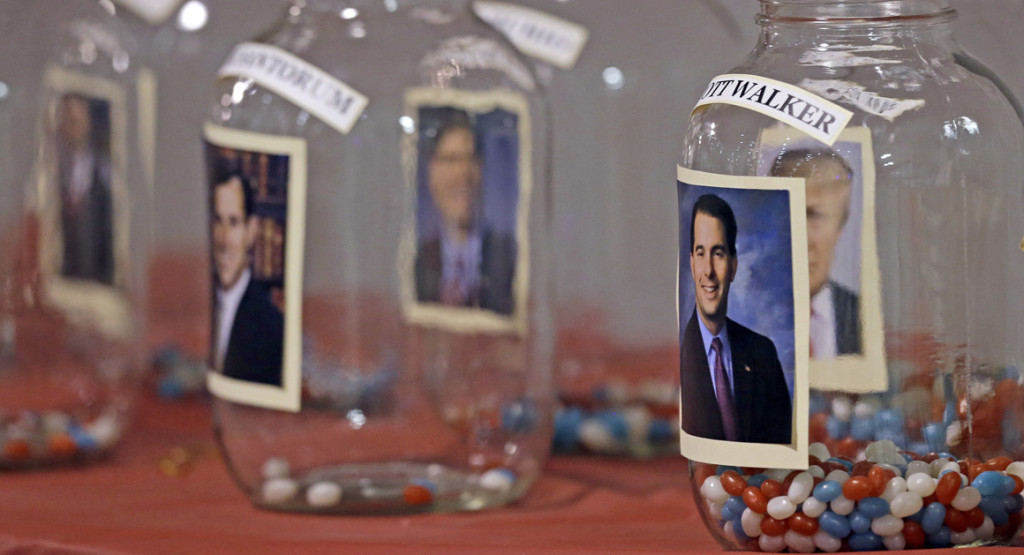
For Scott Walker, it wasn’t one thing that led to the demise of his presidential campaign. It was just about everything. Financial troubles. A bloated staff. Repeated stumbles and flip flops. A candidate that professed to be a fighter, but too often, didn’t show all that much fight. The Wisconsin governor, who dropped out of the Republican race for president on Monday after only two months as a formal candidate, did so after making a litany of mistakes and missteps that could make for a “what not to do” manual for future candidates. Walker entered the 2016 race as an ostensible Republican darling, shot into the national spotlight by his victories over unions and his triumph in a recall election. With Midwestern appeal and conservative credentials, and buoyed by a rousing performance at a Republican forum in January, he rose to the top very of early polls in Iowa. That moment in Iowa proved to be Walker’s high point. As presidential primaries so often reveal, gleaming resumes don’t equal votes or big fundraising totals. And early favorites can quickly fade. “The support he had was relatively soft,” said Republican Wisconsin state Sen. Luther Olsen. “He was at the top essentially because of one speech.” To some extent, Walker is a victim of a campaign in which voters long-frustrated with politics are turning their backs on candidates with long resumes in government. Walker insisted that he, too, would “wreak havoc” on Washington, but he was drowned out by bombastic billionaire Donald Trump. But Walker’s problems were broader than a mismatch with the electorate’s mood and were foreshadowed even during his campaign’s heady early days. On a February trade mission to Europe meant to bolster his foreign policy credentials, Walker refused to answer questions about international affairs. He also punted on a question about whether he believed in evolution. That shallow foreign policy experience and inability to deftly handle questions became more pronounced as the campaign went on. He was widely panned for arguing that his experience fighting unions in Wisconsin had prepared him for defeating the Islamic State in Syria and Iraq. He said it was “legitimate” to discuss building a wall along the U.S.-Canada border. And he gave three different answers about his position on birthright citizenship in a week. Even his efforts to separate himself from Washington fell flat. At one point, he said he isn’t a career politician – despite having held elected office for 22 straight years. “The glare of the klieg lights came early for Walker and it’s hard to be prepared for that type of scrutiny when it’s your first presidential campaign,” said Kevin Madden, who advised Mitt Romney during his second run for president in 2012. Walker also suffered from strategic and structural campaign blunders. While Iowa and its kickoff caucus gave Walker the best chance to grab an early victory, his campaign built a wide network of staff and consultants in states that don’t vote until well into March. But running a national campaign is costly, and Walker and his team burned through cash faster than they could raise it. Even as donors began to grumble about the expensive operation, Walker’s team resisted scaling back or trimming salaries. Walker’s admission last week that he was shifting course and putting “all our eggs in the basket of Iowa” was a sharp departure from his campaign’s confident predictions earlier in the year about plans to rack up delegates throughout the South and Midwest late in the primary contest. In addition to refocusing on Iowa, Walker’s campaign made a last-ditch effort to energize Republicans by reaching back to the issue that had made the governor one of his party’s brightest White House hopes. He unveiled a sweeping blueprint for upending labor unions nationwide, a plan so aggressive that it was even criticized by some Republicans. Then Walker took the stage in last week’s second Republican debate. His union plan garnered no mention from moderators or rival candidates, and Walker didn’t even bring it up himself. Walker needed a standout performance in that debate, one that would validate his assertion that he was a Washington outsider with a fighting spirit. Instead, he generated the least amount of speaking time of the 11 eleven candidates on the stage and gave middling responses when attention did turn his way. The final blow came Sunday, with the release of a new CNN/ORC poll. While polls at this early stage of the race are often fickle, the message to Walker was unmistakable, according to one campaign aide, who insisted on anonymity in order to discuss the team’s internal thinking. Walker, who had once led the GOP field, was registering less than one percent of voter support. His standing as a White House candidate had been reduced to an asterisk. Republished with permission of the Associated Press.
Wisconsin’s Scott Walker exits ’16 race with harsh words for Donald Trump
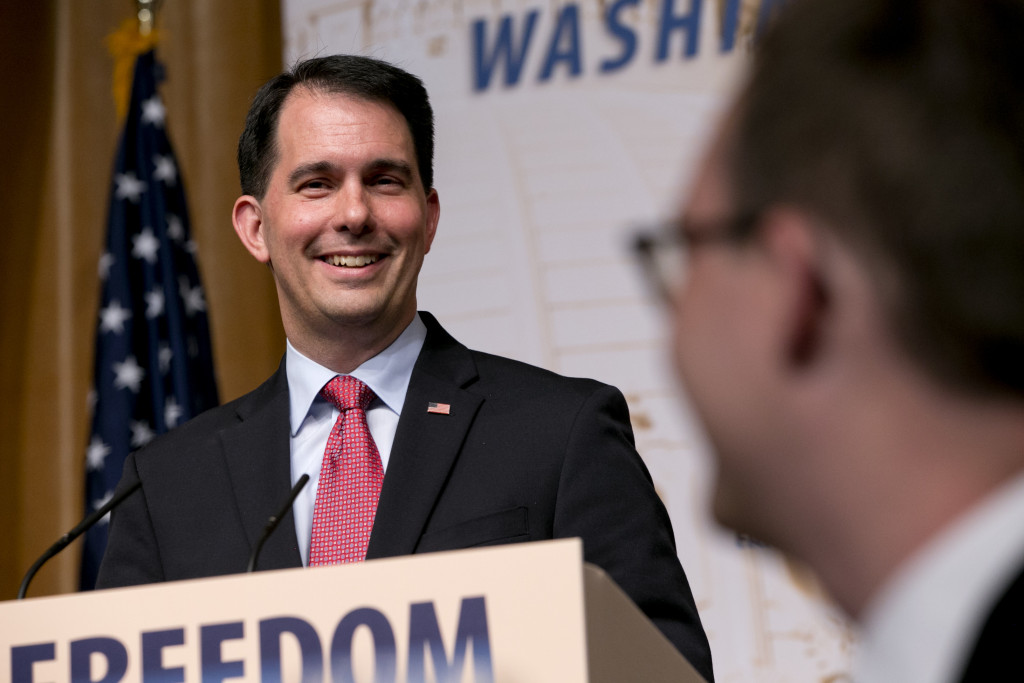
Warning that the Republican presidential race has become too nasty, Scott Walker exited the 2016 campaign on Monday and urged others to quit, too, and “clear the field” so someone can emerge to take down front-runner Donald Trump. The announcement marked a dramatic fall for Walker, who was struggling to generate money and enthusiasm after surging into the race’s top tier earlier in the year. He will return to his job as governor of Wisconsin, where his term runs through 2018. “Today, I believe that I am being called to lead by helping to clear the field in this race so that a positive conservative message can rise to the top,” Walker said in a news conference. “I encourage other Republican presidential candidates to consider doing the same so the voters can focus on a limited number of candidates who can offer a positive conservative alternative to the current front-runner.” Walker said that is “fundamentally important to the future of the party and more importantly to the future of our country.” One of the last Republicans to enter the race, Walker joined former Texas Gov. Rick Perry as one of the first to leave it. He found himself unable to adjust to Trump’s popularity or break out in either of the first two GOP debates. Both candidates warned of the billionaire businessman’s influence on the GOP as they stepped aside, although neither called him out by name. “Sadly, the debate taking place in the Republican party today is not focused on that optimistic view of America,” Walker said. “Instead, it has drifted into personal attacks.” Walker’s sons, Matt and Alex, attended his speech. They each had taken a semester off from college to campaign with him. Anthony Scaramucci, one of Walker’s top fundraisers, expressed hope that other struggling candidates will heed Walker’s call to distill the field. “I think what he did shows real leadership,” Scaramucci said. “He’s sending a signal to the low single-digiters – the new 1 percenters, if you will – that it’s time to go, for the good of the party.” Walker’s departure prompted a good riddance from Richard Trumka, AFL-CIO president, reflecting the hostility between the governor and organized labor. “Scott Walker is still a disgrace,” Trumka said, “just no longer national.” Walker’s fall was in many ways more dramatic than Perry’s. He was thought to be a leader in the big pack for much of the year and built a massive national organization, with paid staff spread across the country, that dwarfed many of his rivals in scale and scope. “I don’t think he made any really big mistakes,” said Iowa state Sen. Mark Costello, who endorsed Walker earlier this year. “But people lost enthusiasm.” Walker, 47, tried to appeal to religious conservatives, tea party conservatives and the more traditional GOP base. He cast himself as an unintimidated conservative fighter who had a record of victories in a state that hasn’t voted Republican for president since 1984. Like Perry, however, Walker found little room for such a message in a race dominated by Trump. Trump tweeted in response to Walker’s decision, “he’s a very nice person and has a great future.” Walker came to the race having won election in Wisconsin three times in four years, and having gained a national following among donors and conservatives by successfully pushing his state to strip union bargaining rights from its public workers. Walker pointed to those Wisconsin wins, in a state that twice voted for Barack Obama as president, as signs that he could advance a conservative agenda as the GOP’s White House nominee. He called himself “aggressively normal” and made a splash in January with a well-received speech before religious conservatives in Iowa. Groups backing Walker went on to raise $26 million, tapping wealthy donors whom Walker had cultivated in his years as governor and during his successful effort to win a recall election in 2012. Walker’s primary super PAC, called Unintimidated, had just begun spending for a major push in Iowa – reflecting the governor’s last-ditch strategy to place all of his chips on that first-to-vote state. The super PAC told federal regulators in a filing Friday that it had spent more than $1.6 million boosting Walker this year, most recently on a $50,000 mailing to Iowa voters. It will now return what it hasn’t spent to its donors. Many of Walker’s troubles were not of Trump’s making. He took days to clarify whether he supported ending birthright citizenship. He initially showed interest in building a wall between the U.S. and Canada, only to laugh it off as ridiculous. He also declared he wasn’t a career politician, despite having held public office for 22 straight years. After his fade in polls, Walker took a more aggressive approach, promising to “wreak havoc” on Washington. He vowed to take on unions as president, just as he did as governor, outlawing them for federal government workers. But the anti-union policy proposal fell flat; announced in the days before the second GOP debate, it wasn’t mentioned at all – by Walker or anyone else – on stage. While only Texas Sen. Ted Cruz and former Florida Gov. Jeb Bush had more super PAC money available to boost their chances in the original 17-person 2016 Republican field, Walker struggled to generate money for his official campaign. He has yet to report fundraising totals to federal regulators, but top fundraisers and donors have said his plummeting poll numbers left them struggling to generate cash. Walker called his senior staff to the governor’s mansion in Madison on Monday to review recent polling, in which he was mired at the bottom, and his campaign’s finances. “I’m disappointed,” said Stanley Hubbard, a billionaire media mogul from Minneapolis who had backed Walker’s campaign. “He’s a good man and would have been a good president.” As word spread of his decision to exit the race, Republican operatives in Iowa working for other campaigns were already making plans to contact state lawmakers who had committed
Scott Walker to drop out of GOP presidential race
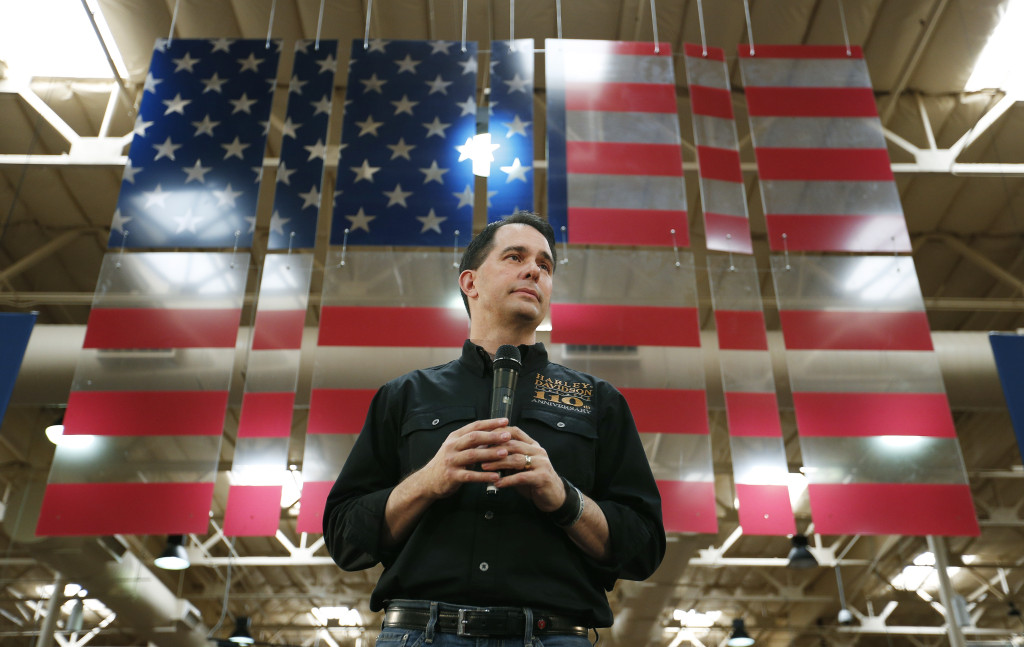
Two people familiar with his decision say Scott Walker is dropping out of the Republican race for president. The Wisconsin governor planned a news conference for Monday evening in Madison, where he was expected to become the second major GOP candidate to quit the race. The people spoke on condition of anonymity because they were not authorized to speak before Walker’s announcement. Walker tried to capitalize on his record taking on unions and got off to a strong start after a well-received speech to Iowa conservatives in January, formally launching his campaign in July. But the 47-year-old Walker fell after a series of stumbles on the campaign trail and forgettable performances in the early GOP debates. Walker joins former Texas Gov. Rick Perry as two early 2016 dropouts. Republished with permission of the Associated Press.
This fall, Jeb Bush bridges two great American institutions: politics and football

As fall arrives, so does two all-American traditions — football and politics. And with the 2016 presidential race in full swing, candidates are beginning to stake ground in both fields. On Saturday, Republican candidate Jeb Bush takes his White House ambitions to Athens, Georgia for the game between the Carolina Gamecocks and the Georgia Bulldogs. Bush will attend a tailgate party hosted by the College Republicans of the University of Georgia. The Gamecocks, underdogs at 1-1, have the added benefit of coming from South Carolina, a key early primary state. The Bulldogs are undefeated at 2-0. On his campaign website, Bush rolled out a schedule of four football-related appearances, as well as the formation of a ten-member Southeastern Conference Advisory Committee. The committee is part of an effort “bring some fun” to the process and drum up grassroots support ahead of the March 15 “SEC primary.” ABC News reports that Right to Rise, the super PAC behind Bush, has been looking into advertising rates for many of the SEC primary states, including Ohio, Missouri and Florida. As governor, Bush also led Florida, another SEC state. “Come meet Jeb on the field,” Bush’s website says, “learn how you can get involved and maybe even take a few selfies.” On Oct. 10, Bush will be at the Tennessee vs. UGA game in Knoxville; he will then go Tuscaloosa, Alabama for the LSU and Alabama Crimson Tide rivalry Nov. 7. Later in the month, Bush will be at the Ole Miss Rebels vs. Mississippi State Bulldogs on November 28 in Starkville, Mississippi. Of course, Bush is not the only one linking football and politics. Four Republican candidates — Donald Trump, Scott Walker, Marco Rubio and Rand Paul — attended a Sept. 12 GOP tailgate event for the Iowa vs. Iowa State match-up, an attempt boost their ground game by appealing to the everyday American football fan/voter.


